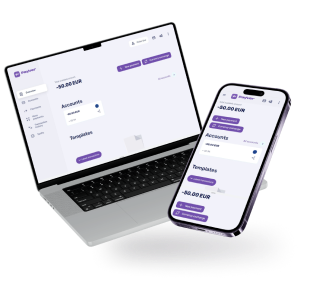Freelancing can be volatile, with alternating periods of intense work and lulls. In order to successfully manage their finances during these quiet moments, freelancers need to follow certain strategies. In this article, we'll look at what to do and what to avoid in order to maintain financial stability.
Do: build a financial cushion
Building an emergency fund is one of the most important financial habits for a freelancer. Try to set aside a portion of your income during periods of high activity so that you always have funds to cover expenses during quiet periods. It is recommended to have savings that can cover at least three to six months of your mandatory expenses.
Plan your budget
Clear budgeting helps you to control your finances more effectively. Calculate your monthly expenses and set a spending limit. This will allow you to know exactly how much money you need to cover mandatory expenses and how much you can set aside.
Diversify your sources of income
Freelancers should look for different sources of income to reduce dependence on one line of work. This could be launching additional services, collaborating with new clients, or even learning new skills that will allow you to enter other markets.
Don't ignore unnecessary spending
When your workload decreases, it's important to critically review your spending. Avoid unnecessary expenses and cut back on spending on non-essential items. This will help you save more money in case of a prolonged downturn.
Automate financial processes
Use modern financial tools to automate your revenue and expense management. Platforms like Payver allow you to receive payments, invoice and manage your transactions faster without unnecessary delays. This can help you take better control of your finances even during periods of downturn in your business.
Don't: Don't expect a steady income
Freelancing is essentially a constantly changing volume of work. Don’t expect all months to be equally successful. Even if you have been earning consistently for several months, always prepare for possible fluctuations in income and be ready for financial challenges.
Don't do: don't rely on just one client
Freelancers often make the mistake of relying on one large client who may be generating a significant percentage of revenue. This increases the risk in case work with that client suddenly stops. Try to always have a few regular clients.
Don't forget to keep track of your debts
Do not delay billing or ignore debts. If customers are late in paying, you need to promptly remind them to fulfill their obligations. This will help you maintain a steady cash flow.
Don't cut back on spending on important tools
While cost optimization is an important strategy, don’t skimp on the tools that help you grow as a professional. Continue to invest in programs, training, and services that can enhance your competitive edge.
For freelancers, financial stability depends on the ability to manage income and expenses during times when work becomes less active. By following these tips — building a financial cushion, planning your budget, optimizing your spending, and continuing to learn — you can successfully navigate periods of downturn. Using platforms like Payver to automate payments and manage your finances will also help you stay financially comfortable and focus on growing your business.






